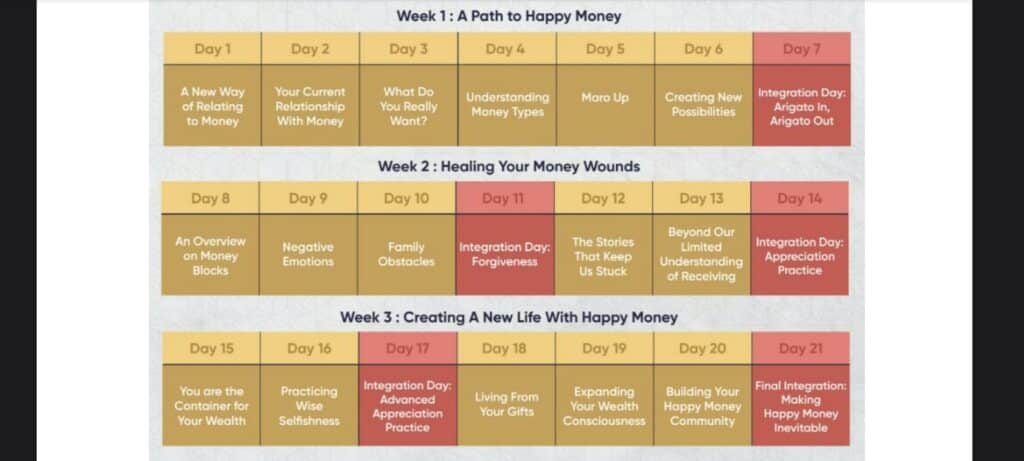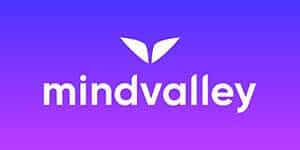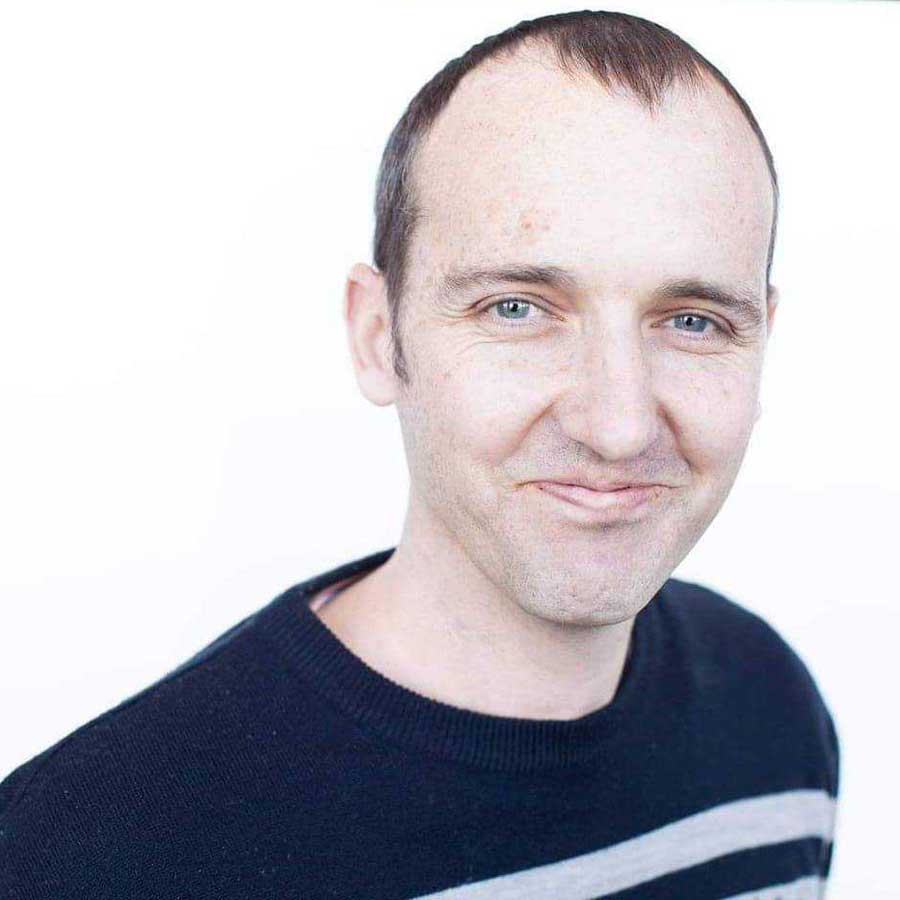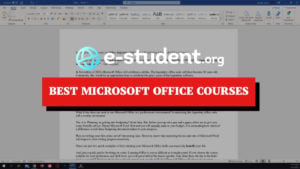Being passionate about mental health and wellness, it was my absolute pleasure to be offered the chance to review a Mindvalley course. Being interested in money-related questions, Money EQ was of particular interest. I wanted to share what this could offer people interested in this topic, so I went through all the lessons to assess what I feel it might give you of value.
In this review, I conclude that although it has negative points worthy of consideration, it gives an excellent learning experience to anyone interested in improving their relationship with money. Here, I will describe my overall experience of working through the lessons and experiencing what I saw as positive and negative points of the program.
Table of Contents
Money EQ? Strange title – but I got over it
The title, ‘ Money EQ, ‘ stood out for me at the start. I wondered why a term such as emotional intelligence would be included in a title. Since this term has become very popularised but is not so tangible, I would have preferred a title telling me something we really get from this course that betters our lives. I found as the course went on that it is a course that helps you to improve your relationship with money and make steps towards your personal vision of wealth. Perhaps there is not an all-encompassing title to display this, but the title as it is seemed a little wishy-washy to me and didn’t grasp me.
An overview of Money EQ
As I quickly got over the course title and went through the lessons and exercises, the word that kept going through my mind was ‘lovely.’ It is a lovely course. I admit I was not familiar with Ken Honda before this course (perhaps this is why the course title did not resonate with me), but as I went through the course, his credibility seemed to just keep shining through at each opportunity. I had this feeling as he spoke about energy and relationship with money, which struck up feelings of the way I’d heard others speak in certain industries, which I’d felt to be manipulative and not ultimately helpful. What I felt with Ken, though, is how he brought back to his own story and his overall massive credibility around making money (certainly not just someone selling books/courses about money). He comes across as someone with authority and expertise who wants to help you with your finances.
There is a fantastic way the course is grounded for you. There are two workbooks that you can use throughout as a point of reflection. These are a Quest workbook and a Preparation guide.
Using the workbooks and completing these practices allow you to see yourself a bit clearer and provide something for you that is tangible. My concern I have had with some past teachings I’ve read around money is they are just words talking about intangible concepts like energy, and you are left with this feeling that you are the problem if you cannot just move beyond this and then get rich. Ken, on the other hand, has this way of speaking from a more genuine expertise, authority, and a real care about ‘your’ experience.

I believe in the benefits of doing things as a group, so creating a mastermind type of experience. There is an opportunity as you go through to share your insights in a Mindvalley community, which I found very helpful.

There are also bonus coaching videos for those interested. I watched one of these and enjoyed it. It’s good to see Ken in more flow and just open conversation and answering some questions.

What does Money EQ teach us?
With an idea about how the course is structured, let’s take a deeper look at the course content.
Find your money archetype
A few lessons into the course, you are invited to complete a money type assessment. I did mine and found mine to be the hippy, lol. It was spot on.
However, whereas I did find this helpful, and I did respect the insights this gave, part of me wondered how these conclusions as to the archetypes and the way they fit into someone being ‘fearful’ and other categories were fundamentally discovered. Considering what seems like Ken’s huge credibility, I don’t doubt that he came to these through his research. However, this leaves an opening where I have known teachings around money before of people just ‘saying things’ and the danger of taking this on board. I may have liked Ken talking a bit more about his discovery of the archetypes and the categories.

Ken spoke here, too, about certain characteristics moving through generations. I felt this comforting sense here of an experienced person, and he seemed therapist-like in speaking about the importance of healing past wounds. I could not help but think of the story of Scrooge in A Christmas Carol. I was starting to think we all have some wounds we can heal.
What is wealth to you?
What Ken also does in this course, which I found … I will say it again ‘lovely,’ is how he invites you to reflect on areas of your life and what being ‘wealthy’ really is to you. This is something I found fantastic and that I had not seen before. This cuts away any objective idea of wealth while also grounding, in my view, a pretty reasonable claim that money is important and building a good relationship with it is important. Ken also talks about diverse cultural conditioning and how these have impacted us and how we may relate to money and see wealth. The entire process has the potential to be extremely liberating for those choosing to do this course.

The meditations
The course is split into three weeks, and there are meditations throughout, which provide a good integration point for Kens’ teachings. These add something and are helpful. However, again, I did not find an explanation for exactly why these would help. This is an area where the course could have gotten even more grounded to take it further away, even from less credible money teachings.
Ken speaks about counseling, people healing their wounds, and his personal experience. As a step further, I think he could have even said something about how meditative practices put us in our slower brainwave state, which helps us integrate things rather than just his words. I do think they are helpful, and I enjoyed them. I just think a few sentences of him saying why could have been great.

At one point, Ken had a lovely deep discussion around money blocks and shame and how things take hold in the subconscious. There was a meditation mixed with this I enjoyed, with a kinaesthetic swirl while being talked through a visual release of this.

A fresh and important take on your relationship with money
In the past, I had mainly heard people speak about relating to money that I would regard more as charlatans than experts. I also heard more enlightening words from Robert Kiyosaki (author of Rich Dad Poor Dad) on the importance of money, being conscious of it, and how we relate to it. I also read Jen Sincero (author of You Are a Badass at Making Money) speak about her huge money blocks and overcoming them and, in the process, learning to speak to how you relate to money like a relationship. It is this point, this actual relationship with money, which Ken helps us work on in this course and what makes it truly valuable.
In one of the exercises, he guides you to think about money like a friend and have a conversation with your wallet (yes, I know it sounds odd, but it’s great). There is something I found potentially quite profound and tangible about the idea of a course to just work on your relationship with money. This is why I truly recommend it.
I like that he’s really getting into that point of the relationship and giving us an experience through this course of working on that directly. The way he spoke about this, as well as his counseling with people, really took me back to ideas of people working on their relationships in therapy, and this is what Ken is helping us to do – but with money.
Lessons that stand out in Money EQ
Although the Quest was overall very interesting, certain lessons stood out to me in particular.
Evolving your beliefs
There was a point where Ken spoke about evolving our beliefs. I know from Coaching training how beliefs make or break us, and what I loved was how he speaks about the evolution of beliefs, for example, the way we outgrow a belief of something like Father Christmas. He then relates this to beliefs about money. I loved this analogy as it gave an immediate loosening up and opened up the a feeling of possibility that maybe we can evolve our beliefs around money too.
Your wealth container
I particularly liked video 15, which discusses a container for wealth and the idea of examining your own and checking for cracks. He used a very clever analogy, and I think people can potentially find this very helpful. Importantly, he takes it back to you seeing your container and grounds this in your view of wealth, which I find fundamentally important if you are doing this course. He highlighted how statistically speaking over 90k per year does not increase happiness. I am not saying you should not want more, but taking back to how your personal wealth idea is important to work to. Making all this individual while adding such useful concepts is vital and made me respect this course. This was one of my favorite lessons of the course.

Wise selfishness
Ken has an extremely healthy lesson called ‘wise selfishness. This deeply resonated with me as a therapist and principles around relationships, self-care, and what another therapist once called ‘selfing.’ This seemed in positive contrast to some of the experiences of ungroundedness I experienced around saying congratulations when something bad happens, etc. Things like this lesson anchored the course for me and was a standout lesson.

What Money EQ does not do as well
Although Honda has crafted an engaging and interesting course, certain aspects could be improved.
A somewhat messy structure
I found some of the lessons regarding “wounds” could have been better structured and did not feel well-defined in their topics. Some topics that had already been partly covered in other sections would have benefited from a more in-depth treatment the first time they were addressed rather than spreading them out.
At certain points in the course, Ken also speaks about his mentor, a great investor who taught him the importance of gratitude and appreciation. Ken speaks about talking with him and asking him about what to invest in, and he recommended investing in companies with ‘high virtue.’
Here, I was skeptical, wondering what is being meant by virtue (as a virtue to me seems a very high value) and also questioning whether all successful companies necessarily have this trait. Is this actual investment advice? Although I am sure his mentor helped him, I honestly didn’t find how the mention of him and any of his words added anything to the course. It was here I found a bit of a muddled experience in the overall structure, as if these words were just thrown in to give a bit of sugar, so to speak, but didn’t add anything of importance. In my opinion, it didn’t detract too much from the course, but it just didn’t add anything.
Grounding teachings in lived experiences
I would have liked more on gratitude and appreciation and how Ken has seen people practice this on a community level. While the principle is sound, how are they carried out, and what are the common struggles experienced when people try to?

Similarly, I liked when Ken spoke about his students going through this process and how they healed their wounds. I would have liked more of the actual stories of the money issues people had, why and the way people overcame them and, again, a more grounded discussion around the archetypes, the way we come to them, and how they may evolve.
Ken discussed a practice around celebrating your future – he speaks about how, in Japan, they celebrate the positive outcome beforehand to create it. I can connect with the idea of having and feeling a vision, but this all seemed a bit of a sugar rush to me. I would again have liked a more grounded experience and reference to examples. For example, the book Psycho-Cybernetics by Maxwell Maltz speaks about creative imagination locking onto a target and basing your actions on this.

How can you access the quest?
You can access this quest through a Mindvalley membership, which costs $99 per month or $499 for a year. Apart from this quest, membership also gives you access to almost all other quests on Mindvalley – many of which are great complements to this one.
Importantly, if you are unsure whether the program is worth it for you, Mindvalley membership comes with a no-questions-asked trial period of 15 days so you can try out the program with no financial risk.
Free masterclass
For those harboring reservations about committing to the full course. Mindvalley and Ken Honda offer a free masterclass, offering students a glimpse of what the complete Money EQ program entails. While the masterclass provides an introductory taste of the course’s concepts, it serves as a teaser rather than a comprehensive overview and presents an opportunity to gauge whether the course resonates with your personal goals.
In a world where many online courses remain shrouded in mystery until enrollment, Money EQ’s free masterclass is a generous offering, allowing prospective participants to make an informed decision.
Final thoughts
This is an excellent course for anyone looking to improve their relationship with money and move towards what can become their vision of wealth. Even if you do not think there is an issue here, I still think it’s worth a look because, if I’m honest, everyone can improve in this area. Looked at like this, the course can offer value to everyone.
I think some of the concepts may not resonate with a Western audience, and some of the ideas taught are not helpful. However, there is so much excellent value in this course around your relationship with money and moving towards wealth while healing your own money wounds. There is something so incredibly liberating about it while being practically helpful. There is excellent value in studying this course – and just taking some things with a grain of salt and using it as a new platform to improve this area of life.
The negative points are always wiped out by the massive positives. I highly recommend it.
Black Friday Special – get 40% off your Mindvalley Membership to get access to 100+ personal growth programs. Note that the discount is applied to the lifetime of your account – not just your first payment.




